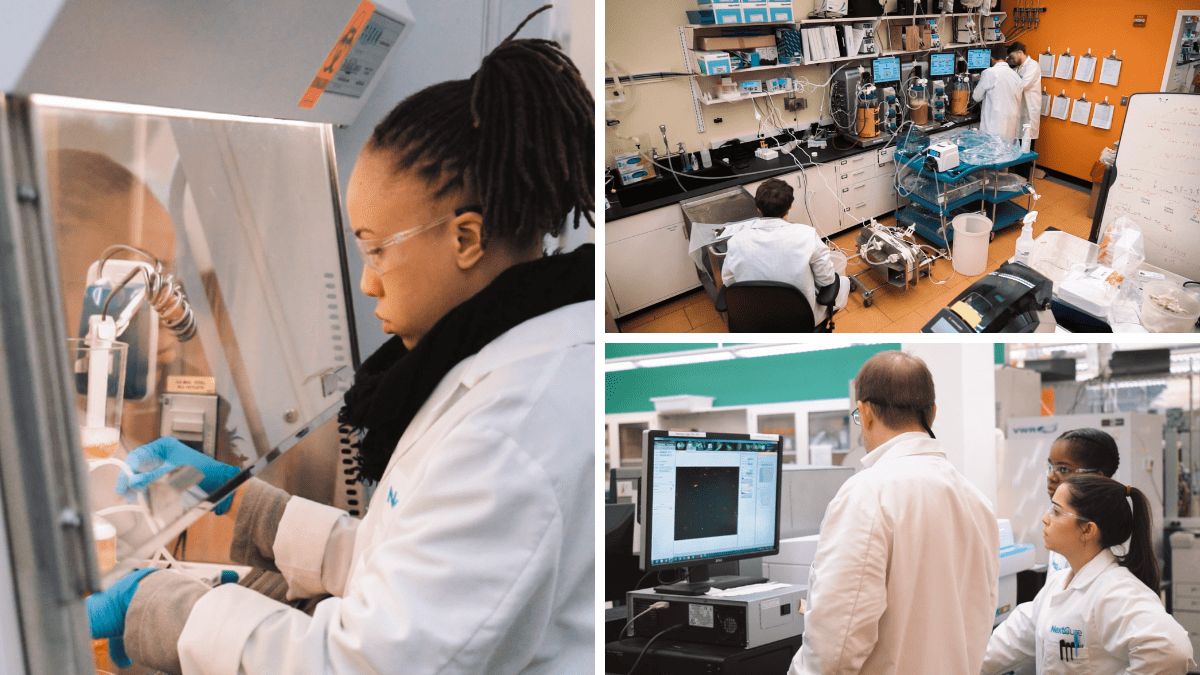
NextCure Launches New GLP Lab, Expands In-House Capabilities
Every successful and growing biotech arrives at the same crossroads eventually: to outsource or build in-house. That becomes the critical question—the fact that this question is being posed is a clear signal of progress, yet it is also one that is difficult to navigate.
For NextCure, a fast-growing, publicly-traded (Nasdaq: NXTC) clinical-stage biotech located in Beltsville, Maryland, choosing to invest in and build capabilities in-house aligned with its mission to serve patients that do not respond to existing therapies.
NXTC is developing novel therapeutics for cancer and immune-related diseases using its proprietary FIND-IO™ technology platform.
“We are deeply committed to patients in need. This is our mission. This is what gets us up in the morning and keeps us working to solve difficult challenges. Our investment in our newly launched Good Laboratory Practices (GLP) Lab at our headquarters, and our newly built 5,000 sq. ft., warehouse facility, reflect our company’s passionate commitment to our patients,” stated Michael Richman, NextCure’s CEO.
NextCure’s new, state-of-the-art GLP lab opened its doors in early August 2022 and officially began regulated GLP work in mid-September.
The new state-of-the-art lab deploys the latest in best practice equipment and automation (that is 3 to 8 times faster), all of which has built-in redundancy. Thelab is also designed in a modular fashion that can scale as NextCure’s needs evolve. Currently, the lab empowers the NXTC team to complete regulated work in-house; the lab can currently test up to 15,000 samples annually.
Abu Kharma sees the GLP lab as an expandable, almost living ecosystem that is a blend of leading-edge lab equipment, streamlined SOPs, aligned regulatory policies, and a collaborative team working in a compliant manner.
“Regulated work is expensive and requires a lot of specialty work, which is often outsourced to Contract Research Organizations (CROs). But we’d had this idea floating around for a while to bring regulated work in-house. We put a cross-functional team together and developed multiple versions of a proposal and received leadership support and now we have this great new capability,” shared Hasan Abu Kharma, Associate Director of Bioanalytical Sciences at NextCure and a key member of the GLP lab project team.
“I develop a lot of our clinical and non-clinical assays for biomarker research as well as immunogenicity assays. Typically, I would develop our pre-validated assays and then hand them off to a CRO to do validation and sample testing,” stated Ona Ichoku, key lab project team member and an Associate Scientist III.
“The big change is now we will keep our assays in-house so I will perform validation and sample testing right here at NextCure,” she added.
“The turning point in moving ahead with the GLP lab was leadership’s urgency, created by the pandemic, around controlling the process and supply chain,” Abu Kharma added. “We needed answers sooner, we needed a more cost-efficient process and the time was just right to do it. Now was the time,” he stated.
Abu Kharma did a comprehensive analysis on the benefits of having a GLP lab in-house. He built out the case for the GLP lab and NXTC’s forward-thinking leadership team bought in.
Having a GLP lab in-house at NextCure is a game-changer for the company. CROs do excellent work, but the extra layer of complexity can create challenges. The new GLP lab eliminates this barrier and gives the NXTC team greater oversight and process control which will reduce costs, expedite critical go/no-go decisions and accelerate pipeline advancement.
Efficiency across the process via lab automation, creating and maintaining standardized operating procedures, facilitating stronger communication across functions, and standing up a reproducible and reliable in-house process are key benefits of NXTC’s new GLP lab.
“The GLP standards were instituted in the late 1970s by the FDA to ensure companies had quality data and were making informed decisions about their programs. The FDA believed GLP standards would give patients the best chance to get access to safe and effective therapies. That’s the objective here. The new GLP lab allows us to bake in quality and make faster decisions,” stated Zachary Cusumano, Vice President of Research and Project Planning.
According to Abu Kharma and Ichoku, NXTC’s new GLP lab has changed the mindset of the NXTC team. Now that the more regulated work is being done in-house, the team is thinking about GLP reproducibility and reliability all the time allowing the team to implement processes earlier than ever before. By the time NXTC gets to assay validation and sample testing, the process is already established, and no time is lost transferring NXTC’s work to an outside CRO.
Standing up the new lab presented some challenges. Keeping operations going smoothly while the lab was being built out was one key challenge that faced NXTC. While one part of the team focused on building out the lab space, Ichoku kept existing non-clinical activities, including assay development and sample testing, moving forward.
“When you have both regulated and non-regulated work going on at the same time, you have to figure out how to balance the two to ensure compliance overall. We worked hard to develop SOPs to make that happen. That was another big challenge during the lab build-out,” shared Ichoku.
“We set out to build NextCure as a fully integrated company that controls as much of its process as possible. We have our GMP manufacturing facility on site that allows us to move quickly from early discovery into the clinic. We are also moving materials into our new warehouse to alleviate supply chain concerns, and the new lab allows us to bring sample testing in-house,” shared Cusumano.
“This all helps us accelerate our development process. For our team the new lab means greater control and enhanced capabilities. For our investors, this means we can make smart, informed decisions more quickly. And for the patients we serve, these new capabilities mean delivering potential new therapies faster,” he added.
The new GLP lab is yet another sign of NXTC’s deeply embedded commitment to building and maintaining the strong quality culture required to achieve the company’s patient-centric mission.
- About the Author
- Latest Posts
Steve brings nearly twenty years of experience in marketing and content creation to the WorkForce Genetics team. He loves writing engaging content and working with partners, companies, and individuals to share their unique stories and showcase their work. Steve holds a BA in English from Providence College and an MA in American Literature from Montclair State University. He lives in Frederick, Maryland with his wife, two sons, and the family dog.





